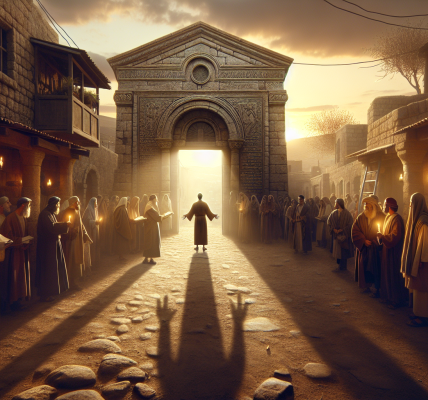In the quiet village nestled among the rolling hills of ancient Israel, the sun rose gently over the horizon, casting a golden glow on the clay rooftops and the dusty paths that wound through the community. The air was filled with the scent of fresh bread baking in outdoor ovens and the distant bleating of sheep grazing in the fields. Among the villagers was a young woman named Miriam, who had recently given birth to her first child, a son. The birth had been a joyous occasion, celebrated with songs and prayers of thanksgiving to the Lord, for He had blessed her and her husband, Eliab, with a healthy child.
Miriam sat in the dimly lit room of her small home, cradling her newborn son in her arms. The baby slept peacefully, his tiny chest rising and falling with each breath. Eliab had gone to the fields early that morning, leaving Miriam to rest and recover. Though she was filled with joy, she also felt a deep sense of reverence and responsibility. She knew that the Law of Moses, given by the Lord, required her to observe certain rituals after childbirth. These rituals were not merely traditions but sacred commands meant to honor God and acknowledge His sovereignty over life and purity.
According to the Law, a woman who gave birth to a son was considered ceremonially unclean for seven days, just as she would be during her monthly period. On the eighth day, the child was to be circumcised, as a sign of the covenant between God and Abraham’s descendants. After this, the mother would continue in a state of purification for an additional thirty-three days, during which she was to avoid touching anything sacred or entering the sanctuary. If the child were a daughter, the period of uncleanness and purification would be doubled. Miriam had given birth to a son, so her time of purification would last forty days in total.
Miriam knew that these laws were not meant to shame her but to remind her and the entire community of the holiness of God. The process of purification was a way to acknowledge that life, though a gift from God, also carried with it the effects of sin and brokenness. By observing these rituals, Miriam was participating in a sacred act of worship, recognizing her need for God’s grace and mercy.
As the days passed, Miriam carefully followed the instructions given in the Law. On the eighth day, Eliab and Miriam brought their son to the priest for circumcision. The ceremony was brief but profound, as the priest invoked the name of the Lord and performed the rite that marked the child as part of God’s covenant people. Miriam’s heart swelled with gratitude as she watched her son, now bearing the sign of the covenant, and she whispered a prayer of thanks to the Lord for His faithfulness.
The weeks that followed were a time of quiet reflection for Miriam. She spent her days caring for her son, nursing him, and singing lullabies that spoke of God’s promises to His people. She avoided the tabernacle and refrained from touching anything holy, as the Law required. Though she longed to join the community in worship, she understood that this season of separation was a reminder of her dependence on God’s cleansing and restoration.
Finally, the forty days came to an end. Miriam prepared herself for the final act of purification. According to the Law, she was to bring two offerings to the tabernacle: a year-old lamb for a burnt offering and a young pigeon or dove for a sin offering. If she could not afford a lamb, she could bring two doves or two pigeons instead. Miriam and Eliab were not wealthy, so they brought two turtledoves, carefully selected and presented as a humble offering to the Lord.
On the morning of the fortieth day, Miriam wrapped her son in a soft blanket and carried him in her arms as she and Eliab made their way to the tabernacle. The journey was not long, but it felt significant, as if each step brought her closer to the presence of God. The tabernacle stood at the center of the village, its white linen walls gleaming in the sunlight. The scent of incense wafted through the air, mingling with the sounds of prayers and the lowing of cattle brought for sacrifices.
Miriam approached the priest with her offerings, her heart pounding with a mixture of reverence and anticipation. The priest accepted the turtledoves and prepared them for the altar. As the smoke from the burnt offering rose into the sky, Miriam felt a profound sense of peace. The sin offering, a reminder of her need for forgiveness, was also presented, and the priest pronounced her clean before the Lord.
With tears in her eyes, Miriam lifted her son toward the heavens and offered a prayer of dedication. “Lord, this child is Yours,” she whispered. “Thank You for the gift of life and for Your mercy that makes us clean. May he grow to love and serve You all his days.”
Eliab placed a hand on her shoulder, his own eyes glistening with emotion. Together, they stood in the shadow of the tabernacle, grateful for the grace that had brought them to this moment. The Law, though demanding, was a gift—a way for them to draw near to God and to remember His holiness and their need for Him.
As they returned home, Miriam felt a renewed sense of purpose. The days of purification were over, but the lessons they had taught her would remain in her heart. She knew that her journey of faith was far from finished, but she also knew that the Lord would walk with her every step of the way. And as she looked down at her son, sleeping peacefully in her arms, she whispered a final prayer: “Thank You, Lord, for Your faithfulness. May we always live in the light of Your holiness.”




